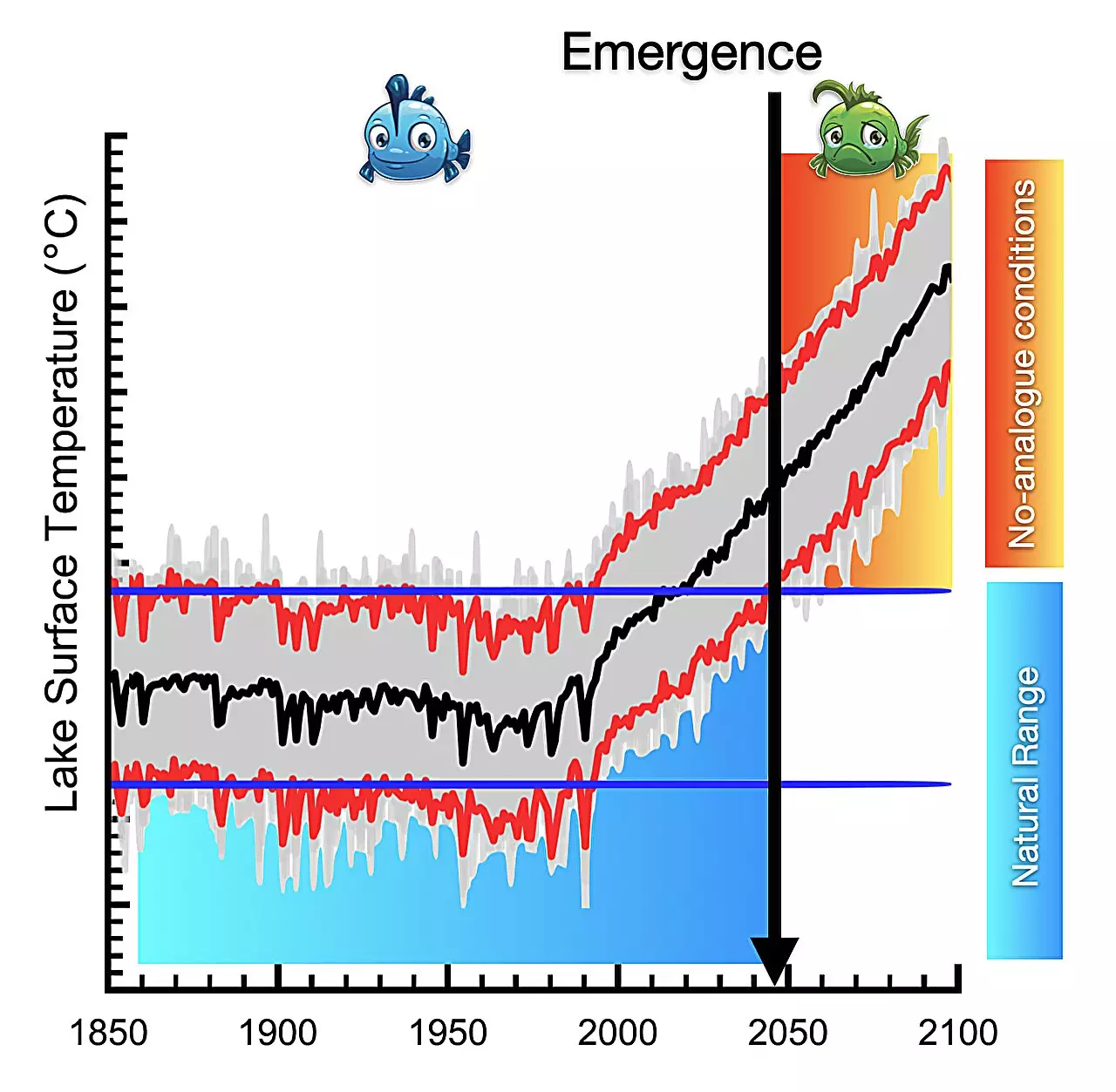Lakes are often the unsung heroes of our planet’s ecosystem. They not only provide vital habitats for countless species but also support human livelihoods and contribute to climate regulation. Unfortunately, a groundbreaking study published in Nature Geoscience reveals that the situation for lakes is growing increasingly dire due to climate change. The researchers, through simulations conducted with advanced climate models, predict that by the end of this century, lakes will experience unprecedented temperature rises—both on the surface and beneath. This alarming scenario suggests that lakes could soon endure a climatic reality never recorded in human history, making immediate attention and remedial measures crucial.
The complexity of this situation lies in how researchers have approached their models. Utilizing the Community Earth System Model (version 2), these scientists dove deep into historical climate data stretching from 1850 to 2100. But rather than relying on a single prediction, they conducted a robust ensemble of 100 simulations that reflect natural climate variations alongside the effects of human-induced warming. This meticulous work sheds light on the intricate dynamics between our climate and its freshwater systems, revealing not just bleak statistics but a dire need for a global response to protect these vital ecosystems.
Tropical Lakes: The First Casualties of Warming
One of the most critical findings of the study is the vulnerability of tropical lakes. With their rich biodiversity, these lakes are poised to face catastrophic changes first, once global temperatures rise about 2.4°C above pre-industrial levels. For organisms living in these ecosystems, the implications are grave. While some species may attempt to adapt by moving vertically to cooler subsurface layers, the study underscores that this is not a sustainable solution. The rapid transmission of warming through mixing events will likely reach depths where many species find refuge, leaving them with nowhere to escape.
Dr. Lei Huang and his team pioneer insights in this research, particularly how no-analog climate conditions—states that have never been observed before—will develop in both surface and subsurface layers of lakes. Understanding these patterns is crucial for realizing when specific lakes will cross this threshold. Unfortunately, not all lakes will experience these changes uniformly. High-latitude lakes may find themselves with a slight delay in warming impacts due to their natural stratification, but this should not deliver any sense of comfort or complacency. Research shows that over time, even these ecosystems will succumb to the effects of anthropogenic climate change.
No-Analog Conditions: An Ecosystem on the Brink
The notion of no-analog conditions takes center stage in scientists’ discussions of future lake health. The concern is not merely academic; we are talking about ecosystems that have developed over millennia facing catastrophic disruption. Prof. Axel Timmermann emphasizes that while terrestrial and marine organisms may have the mobility to adapt to shifts in climate, lake-dwelling species are far more limited in their ability to relocate. This explains why understanding the emergence of no-analog conditions becomes vital; if proactive measures are not taken, the ecological repercussions could be disastrous.
Furthermore, the consequences stretch beyond the organisms that call lakes home. The vital services that lakes provide—such as clean water, food supply, and recreation—are undeniably interlinked with the health of their biological communities. A decline in biodiversity or a sudden shift in the lake’s ecological balance can severely affect human communities reliant on these resources. In light of these findings, it becomes apparent that climate mitigation and adaptation strategies in lake ecosystems cannot wait for the crisis to unfold. We should be actively evaluating how best to foster resilience against impending changes.
A Call for Collective Action
The study serves as both a wake-up call and a road map for policymakers, conservationists, and scientists alike. If we were to truly grasp the gravity of this situation, it should rally communities globally to prioritize preserving lake ecosystems that are showing signs of distress. Collaborative efforts, innovative solutions, and widespread education are urgently needed. Investment in sustainable practices and policies must become a priority as lakes face an uncertain future.
In essence, the warming of lakes represents a microcosm of the broader climate crisis, and as stewards of our environment, we bear the responsibility to intervene decisively. With science illuminating the path, we can align efforts across governments, NGOs, and communities to secure the longevity of these ecosystems. The time for action is now—before the temperatures rise beyond recovery and the impacts ripple through entire ecosystems.

